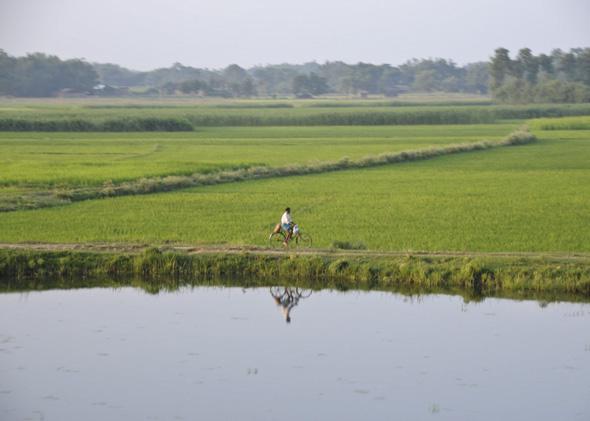In perhaps no other place in the world are the streets as crowded as in New Delhi. Streams of cars, bikes, people, and even animals impossibly weave through one another. For thousands of years, New Delhi and the cities that preceded it have been sustained by the sacred water of the Ganges and her tributaries. But as India continues to develop into one of the world’s leading economies, the stress of a fast-growing population and increased urbanization has rendered the Ganges polluted almost beyond use. India’s air pollution is among the worst in the world. Garbage is heaped in streets and often left uncollected for weeks, or longer.
The sight and even more, the stench of inescapable pollution may well be why, when asked as part of Greendex study (a survey that ranks the environmental sustainability of 14 industrialized and developing countries) Indians were most likely to claim that they “feel guilty about the impact [they] have on the environment.” As anyone who has forgotten to roll the trash to the curb for a week or two can tell you, the tangibility of one’s own waste accumulating unchecked can become a bit overwhelming. Further still, it’s incredible how little trash one manages to make when the can is already full.
The 2012 Greendex study, conducted by the National Geographic Society, captures this “full-can” phenomenon on a larger scale: The guiltier a country feels about its environmental impact, the greener its behavior. It is no surprise then that India, the country that feels the most guilt of the 14 surveyed, is also ranked first in the Greendex study for the fourth time running. In fact, developing countries such as India, China, and Brazil, though often portrayed as contributing more than their fair share of pollution to support their growing economies, are consistently ranked higher in terms of sustainable behavior than the established industrial countries of North America and Europe, despite the developed countries’ longer history of environmental regulations. In part because people in developing countries tangibly experience environmental problems such as water and air pollution, they adopt more sustainable behavior. Americans, who reported the least guilt about their impact on the environment, were ranked dead last in the most recent Greendex study—for the fourth time in a row. (You can learn your own Greendex score at National Geographic’s Greendex Calculator.)
Of course, there is more to environmentally sustainable behavior than feeling accountable for one’s impact. Greendex scores are determined on the basis of 65 measures in four main categories of consumption: housing, transportation, food, and goods. The indices cover everything from the purchase of bottled water to whether one owns a second home. Many of these measures fit under the big umbrella of energy consumption. For example, participants were asked if they washed their clothes in cold water; walked, biked, or drove to work; heated or cooled their homes; and whether they purchased energy-saving appliances. India leads the rest of the countries in the Greendex in three of the big four categories, coming in third to China and Hungary in the category of transportation alone.
Indians hold an especially strong lead in the category of food consumption, in part because of their cultural distaste for consuming beef. In fact, 64 percent of those surveyed in India claimed they didn’t eat it at all. (The next lowest score isn’t even close: Among Hungarians, only 12 percent claimed no beef consumption.) Indian consumption of chicken and seafood is among the lowest of countries surveyed as well. A large percentage of Indians are vegetarians either by choice or by circumstance. More and more studies have revealed harmful effects of livestock farming, such as water contamination from fecal matter and a nearly 20 percent contribution of greenhouse gas emissions worldwide. It has become clear that meatless diets can have a big impact on the environment, and these consumption measures contribute greatly to India’s sustainability ranking. In addition, Indians frequently eat locally grown food, and even more so, food that they have personally cultivated.
Although India remains the reigning Greendex champ, the country suffered losses in every category but housing since 2010, most notably in the categories of goods consumption and transportation. Indians are also among the likeliest of those surveyed to say that they aspire to own a big house and the most likely to say they desire a luxury car. These attitudes about consumption correlate with the growing middle class in India. Like many of us with some disposable income, Indians are now more likely to purchase new goods rather than repair old ones, and because luxury cars and large houses are obvious status symbols, it’s natural for those who hope for new wealth to dream of making such purchases. The growing middle classes in China and Brazil also demonstrate a relatively high desire for luxury cars and large houses. At the same time, increases in wealth sometimes translate to the purchase of more costly energy-saving appliances and cars, and many Indians are opting for the extra investment in these types of big-ticket items. It is still too soon to tell whether responsible purchasing will be enough to offset the effects of an increased number of middle-class Indian consumers.
India is poised to move solidly into the category of “developed” rather than “developing” countries, and it’s up to the people of India to decide what that means. Sadly, the average wealth of a country’s citizen is as negatively correlated to environmentally sustainable behavior as guilt is: The more easily we meet our individual needs, the less likely we are to consider our impact on the world around us. India could become a powerful example for the rest of the world if it is able to break that trend and strike the balance between economic growth and environmental responsibility.
Thanks to Pankaj Jain of the University of North Texas, author of Dharma and Ecology of Hindu Communties.
